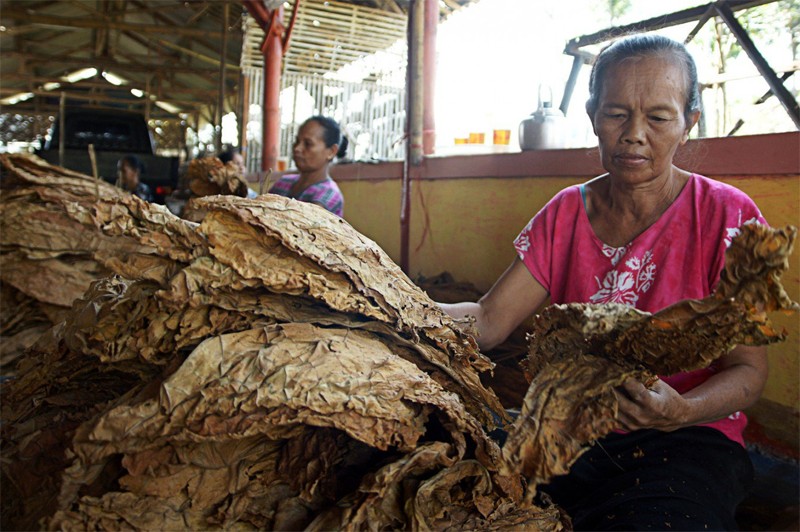Popular Reads
Top Results
Can't find what you're looking for?
View all search resultsPopular Reads
Top Results
Can't find what you're looking for?
View all search resultsTobacco epidemic a threat to Indonesia's bid to achieve SDGs
Tobacco industry in Indonesia still prevails to yield profits from people’s sufferings.
Change text size
Gift Premium Articles
to Anyone
T
oday the world is celebrating World No Tobacco Day. Themed “Tobacco: A threat to development”, the event serves as a reminder for countries to strengthen their tobacco control strategy as an important effort to achieve the Sustainable Development Goals in 2030.
It will be way too hard to reduce one-third of premature deaths from noncommunicable diseases (SDG target 3.4), cut a half of people living in poverty (SDG target 1.2), and combat climate change (SGD target 13) if we mistakenly perceive tobacco consumption as an opportunity rather than serious harm. Unfortunately, Indonesia still holds that belief.
According to the most recent WHO report, almost two in three Indonesian males smoke, with mostly starting the habit at 15-19 years old. The addiction has further dragged families into poverty as smoker could spend 14.5 percent the national median income to buy 10 of the cheapest cigarettes every day. This has led to 200,000 tobacco-related deaths annually, surpassing tuberculosis attributable mortality rate which stood at 150,000 in 2015.
Furthermore, Indonesia suffers annual losses of Rp 500 trillion (US$ 37.5 billion) from the direct and indirect negative impacts of smoking, outweighing the revenue from tobacco taxes which only reach Rp 145 trillion ($10.9 billion) a year. Thus, tobacco epidemic should not be treated as a mere health problem but also a crucial development issue.
However, tobacco industry in Indonesia still prevails to yield profits from people’s sufferings. Cigarette sales in Indonesia are estimated at around 248 billion sticks in 2015 with 6.5 percent of annual growth rate, making Indonesia the second-largest cigarette market in Asia after China. Although more than half of their market share has been taken over by international firms, tobacco companies continue to proclaim themselves (and by some groups) as defender of tobacco farmers and the country’s heritage. No wonder they could conveniently interfere tobacco control policy making, capitalizing on the already weak tobacco regulations.
After trying to smuggle out an important paragraph stating “nicotine is an addictive and dangerous substance” from the 2009 Health Law, the pro-tobacco industry group has never stopped its efforts. They are wooing the House of Representatives to table the tobacco bill, which includes the cigarettes production growth target. Recently, the House said it might drop the bill if the government issued a ministerial regulation adopting substances of this proposed bill.
The relentless efforts benefit none of tobacco farmers, laborers and the poor. Why?
First and foremost, tobacco industry provides less and less benefit to tobacco workers. Big companies, like Sampoerna which is owned by Philip Morris, keep slashing the number of workers as they shift to machines. In addition to the growing mechanization, cartel-like practices in tobacco trade have undermined small and local manufacturers that rely on manual production.
Due to weather and monopoly practice, tobacco farmers now only earn Rp 775,000 per month on average, one-third of their earning in the past. In fact, tobacco is unsustainable crop which is worth less than other crops like potato, corn, rice and tomato.
The most staggering fact is Indonesian and multinational tobacco giants make money off the back and health of many child workers who are exposed to hazardous nicotine, pesticides and other toxic chemicals.
Second, tobacco farming harms the environment as it requires a large amount of pesticides and fertilizers, which can toxicate and pollute water. This business uses 4.3 million hectares of land, contributing 2-4 percent to global deforestation. About 1.69 billion pounds of cigarette butts wind up as toxic trash. Additionally, tobacco manufacturing produces over 2 million tons of solid waste. This figure clearly demonstrates that tobacco industry perpetuates climate change.
Lastly, tobacco endangers equality as the industry markets its product aggressively to women and children. Despite the hike in cigarette retail price almost every year, cigarettes are getting more affordable even for the poorest and youngsters. This potentially creates the economic gap even larger in the future.
We could also lose our demographic bonus in the next 20-30 years if the young generation keeps puffing on the cigarettes either actively or passively. The last survey suggests the government should increase the cigarette prices threefold (Rp 50,000 per pack in average) to reduce consumption by 72 percent. However, this will not come into force until the House amends Excise Law No. 39/2007 which restricts the excise tax at a maximum of 57 percent of the retail price.
We should admit that tobacco destroys not only our body but also our growth as a sovereign nation. Therefore, fighting smoking addiction is not merely a personal responsibility. The narrative of tobacco should go beyond “health”.
Indeed, the government must take real actions rather than merely celebrating Wold Tobacco Day every year. We failed to achieve most of Millennium Development Goals (MDGs) because we began too late and acted fragmentedly.
Now, 2030 SDGs is a new opportunity to start it over by prioritizing and incorporating tobacco control in every development agenda. Likewise, as individuals, we can speak up against the myth spread by powerful tobacco industry that repeatedly sways public opinion.
***
The writer is an Indonesian physician who is pursuing Master of Public Health degree at Imperial College London. She is also an Indonesia Endowment Fund for Education (LPDP) awardee. She can be reached at Facebook (fb.com/beladenta) and personal blog (https://belabelle.wordpress.com/).
---------------
We are looking for information, opinions, and in-depth analysis from experts or scholars in a variety of fields. We choose articles based on facts or opinions about general news, as well as quality analysis and commentary about Indonesia or international events. Send your piece to academia@jakpost.com. For more information click here.










